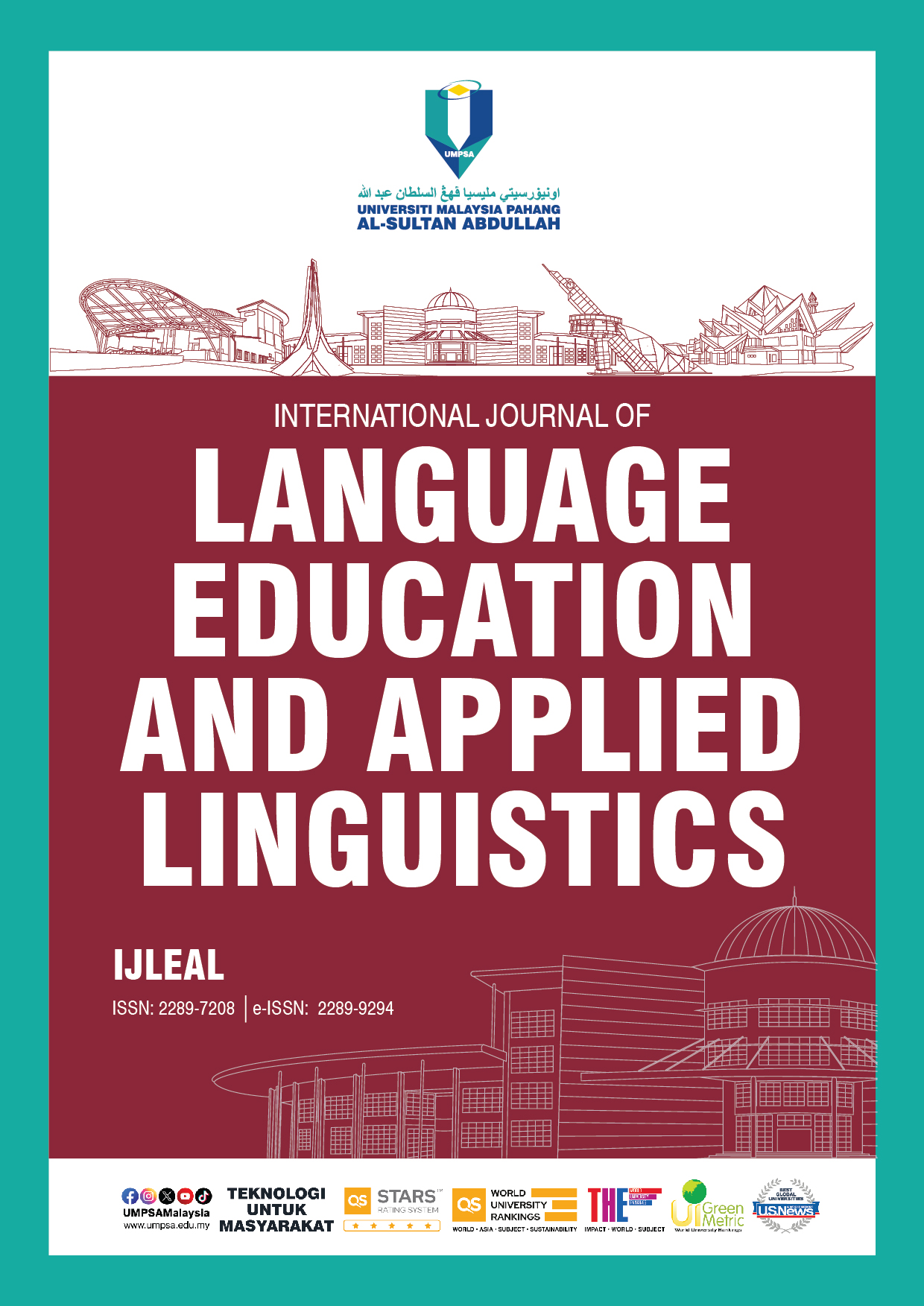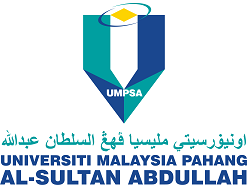Current Trends on the English Language Teacher Professional Development
DOI:
https://doi.org/10.15282/ijleal.v15i1.11198Keywords:
Current trends, English language, Teacher professional development program, Thematic reviewAbstract
The professional development of English language teachers is essential for enhancing their proficiency and teaching competency. This study examines the current state of Teacher Professional Development (TPD) programmes aimed at improving the English language pedagogical skills of teachers. Despite the importance of these programmes, there remains a gap in understanding how effectively they address the needs of teachers and align with educational policies. By conducting a thematic review of literature published between 2019 and 2024, this research explores key themes in TPD for English language teachers. Utilising keywords such as English language and teacher professional development from the SCOPUS and WoS databases, the study identifies five central themes: digital and technological integration professional development, teacher beliefs, perceptions, and practices, specific training programmes and frameworks, the impact of professional development on teaching quality and student outcomes, and professional development in various educational contexts. The findings provide valuable insights for educators, policymakers, and stakeholders aiming to enhance the quality and impact of TPD programs for English language teachers.
References
Abraham, M., Arficho, Z., Habtemariam, T., & Demissie, A. (2022). Effects of information communication technology-assisted teaching training on English language teachers’ pedagogical knowledge and English language proficiency. Cogent Education, 9(1). https://doi.org/10.1080/2331186X.2022.2028336
Achmad, S., & Miolo, S. (2021). Preparing prospective and sustainable efl professional teacher development by applying blended lesson study and clinical supervision. European Journal of Educational Research, 10(3), 1449–1470. https://doi.org/10.12973/EU-JER.10.3.1449
Ahmad, H., & Shah, S. R. (2022). Teacher agency and professional development: A study on Cambridge English teacher program in the Arabian Gulf. Cogent Education, 9(1). https://doi.org/10.1080/2331186X.2022.2080352
Al Siyabi, J., Tuzlukova, V., Al Kaabi, K., & Almaawali, A. (2024). Inclusion in the Context of English Language Classroom: Teachers’ Current Beliefs and Practices. Journal of Teaching English for Specific and Academic Purposes, 12(1), 1–14. https://doi.org/10.22190/JTESAP230223001A
Al-Bargi, A. (2021). ELT online teachers’ professional development during the Covid-19 pandemic outbreak: Perceptions, implications and adaptations. Theory and Practice in Language Studies, 11(10), 1161–1170. https://doi.org/10.17507/tpls.1110.03
Al-Busaidi, S., & Al-Seyabi, F. (2021a). Project-based learning as a tool for student-teachers’ professional development: A study in an Omani EFL teacher education program. International Journal of Learning, Teaching and Educational Research, 20(4), 116–136. https://doi.org/10.26803/ijlter.20.4.7
Almossa, S. Y., & Alzahrani, S. M. (2022). Assessment approaches of English language teachers in the Saudi higher education context. Language Testing in Asia, 12(1). https://doi.org/10.1186/s40468-022-00160-x
Alruqi, S. M., & Alharbi, M. S. (2022). Teachers’ Perceptions Towards Professional Development Training Courses: Exploring the Effects on Teachers’ Performance in the Saudi Context. Theory and Practice in Language Studies, 12(9), 1723–1735. https://doi.org/10.17507/tpls.1209.04
Aziz, A. H. A. A., Zainudin, W. Z. B. W., & Rashid, R. Ab. (2020). Supporting english as a second language (ESL) teachers’ professional development through multi-platforms’ online affinity space. International Journal of Interactive Mobile Technologies, 14(9), 258 – 264. https://doi.org/10.3991/ijim.v14i09.11158
Banegas, D. L. (2021). Understanding the impact of teaching systemic functional grammar in initial English language teacher education. International Journal of Applied Linguistics (United Kingdom), 31(3), 492–507. https://doi.org/10.1111/ijal.12346
Banegas, D. L., & Glatigny, R. (2021). The ateneo as an effective model of continuing professional development: findings from southern Argentina. Pedagogies, 16(4), 363–377. https://doi.org/10.1080/1554480X.2021.1897012
Bayram, İ., & Bıkmaz, F. (2021). Implications of Lesson Study for Tertiary-Level EFL Teachers’ Professional Development: A Case Study from Turkey. SAGE Open, 11(2). https://doi.org/10.1177/21582440211023771
Braun, V., & Clarke, V. (2021). Thematic analysis: A practical guide (1st ed.). Sage Publications.
Camila Coronado-Rodriguez, C., Fernanda Aguilar-Pena, L., & Fernanda Jaime-Osorio, M. (2022). A Task-based Teacher Development Program in a Rural Public School in Colombia. How-A Colombian Journal for Teachers Of English, 29(1), 64–83. https://doi.org/10.19183/how.29.1.640
Choi, L. J., & Park, M. Y. (2022). Teaching Practicum During COVID-19: Pre-Service English Language Teachers’ Professional Identities and Motivation. SAGE Open, 12(3). https://doi.org/10.1177/21582440221119472
Choi, W., Kim, W. H., Wright, W. E., & Morita-Mullaney, T. (2023). Improving English language arts instruction in Indiana dual language bilingual education classrooms. Language and Education, 37(2), 151–170. https://doi.org/10.1080/09500782.2022.2032731
Clarke, V., & Braun, V. (2013). Successful Qualitative Research: A Practical Guide for Beginners. In Successful qualitative research. SAGE Publications Inc.
Dafouz, E. (2021). Repositioning English-Medium Instruction in a Broader International Agenda: Insights from a Survey on Teacher Professional Development. Revista Alicantina de Estudios Ingleses, 34, 15–38. https://doi.org/10.14198/raei.2021.34.08
Darling-Hammond, L., Hyler, M. E., & Gardner, M. (2017). Effective teacher professional development. Learning Policy Institute. https://learningpolicyinstitute.org/product/teacher-prof-dev
Darling‐Hammond, L. (2000). Teacher quality and student achievement: A review of state policy evidence. Education Policy Analysis Archives, 8(1). https://doi.org/10.14507/epaa.v8n1.2000
Darman, D. (2023). The effect of teaching quality and campus facilities on student learning motivation. The Eastasouth Journal of Learning and Educations, 1(2). https://doi.org/10.58812/esle.v1i02.100
Desimone, L. M. (2009). Improving impact studies of teachers’ professional development: toward better conceptualizations and measures. Educational Researcher, 38(3), 181–199.
Desimone, L. M., Stornaiuolo, A., Flores, N., Pak, K., Edgerton, A., Nichols, T. P., Plummer, E. C., & Porter, A. (2019). Successes and Challenges of the “New” College- and Career-Ready Standards: Seven Implementation Trends. Educational Researcher, 48(3), 167–178. https://doi.org/10.3102/0013189X19837239
Donlon, E., & Tiernan, P. (2023). Chatbots and citations: An experiment in academic writing with generative AI. Irish Journal of Technology Enhanced Learning, 7(2). https://doi.org/10.22554/ijtel.v7i2.125
Giraldo, F. (2020). A post-positivist and interpretive approach to researching teachers’ language assessment literacy; [Un enfoque post-positivista e interpretativo para investigar la literacidad en evaluación de lenguas de docentes]. Profile: Issues in Teachers’ Professional Development, 22(1), 189 – 200. https://doi.org/10.15446/profile.v22n1.78188
Giraldo, F., & Yan, X. (2023). Planning an Online Assessment Course for English Language Teachers in Latin America. PROFILE- Issues in Teachers Professional Development, 25(2), 147–164. https://doi.org/10.15446/profile.v25n2.104703
Guskey, T. R. (2002). Professional development and teacher change. Teachers and Teaching: Theory and Practice, 8(3), 381–391. https://doi.org/10.1080/135406002100000512
Hatuye Helate, T., Metaferia, T. F., & Gezahegn, T. H. (2023). Professional development for academic engagement: Primary school EFL teachers’ perceptions and predictors. Social Sciences and Humanities Open, 8(1), 100577. https://doi.org/10.1016/j.ssaho.2023.100577
Head, J., Lysenko, L., Wade, A., & Abrami, P. C. (2023). Scaling up a Technology-Based Literacy Innovation: Evolution of the Teacher Professional Development Course. International Journal Of Technology In Education, 6(4), 541–560. https://doi.org/10.46328/ijte.541
Hiew, W., & Murray, J. (2021). Enhancing Huber’s evaluation framework for teacher professional development programme. Professional Development in Education, 00(00), 1–15. https://doi.org/10.1080/19415257.2021.1901236
Hung, D. M., & Thuy, P. T. (2021). Reflective Teaching Perceived and Practiced by EFL Teachers - A Case in the South of Vietnam. International Journal of Instruction, 14(2), 323–344. https://doi.org/10.29333/iji.2021.14219a
Imran, M., Almusharraf, N., Sayed Abdellatif, M., & Ghaffar, A. (2024). Teachers’ perspectives on effective English language teaching practices at the elementary level: A phenomenological study. Heliyon, 10(8). https://doi.org/10.1016/j.heliyon.2024.e29175
Jati, A. G. (2023). MOOC as a technology-focused TPD for EFL teachers in Indonesia. Indonesian Journal of Applied Linguistics, 13(2), 270 – 282. https://doi.org/10.17509/ijal.v13i2.63067
Johnston, R. B. (2016). Arsenic and the 2030 Agenda for sustainable development. Arsenic Research and Global Sustainability – Proceedings of the 6th International Congress on Arsenic in the Environment, AS 2016, 12–14. https://doi.org/10.1201/b20466- 7
Koşar, G., Dolapçıoğlu, S., & Akbana, Y. E. (2022). Identifying Professional Development Practices and Needs of The English Language Teachers Teaching at Anatolian High Schools in The County of Antakya, Turkey. Participatory Educational Research, 9(5), 243–261. https://doi.org/10.17275/per.22.113.9.5
Kunter, M., Klusmann, U., Baumert, J., Richter, D., Voss, T., & Hachfeld, A. (2013). Professional Competence of Teachers: Effects on Instructional Quality and Student Development. In Journal of Educational Psychology. https://doi.org/10.1037/a0032583
Lo, N. P. K., & to, B. K. H. (2023). The transformation of identity of secondary school teachers: Professional development and English language education strategies in Hong Kong during the COVID-19 pandemic. Cogent Education, 10(1). https://doi.org/10.1080/2331186X.2022.2163790
Mirici, I. H., & Pulatsu, G. (2022). Current trends in professional development: A quick guide for English language educators. Journal for Educators Teachers and Trainers, 13(4), 317–328. https://doi.org/10.47750/jett.2022.13.04.043
Mohamed Mohamed Ali El Deen, A. A. (2023). The role of educational initiatives in EFL teacher professional development: a study of teacher mentors’ perspectives. Heliyon, 9(2). https://doi.org/10.1016/j.heliyon.2023.e13342
Nekongo-Nielsen, H. N., & Ngololo, E. N. (2020). Principals’ experiences in the implementation of the English Language Proficiency Programme in Namibia. Journal of Educational Administration, 58(1), 81 – 95. https://doi.org/10.1108/JEA-06-2018-0113
Nguyen, G. H., & Stracke, E. (2023). An Exploration of Teacher Roles in Blended EFL Contexts in Vietnam. JOURNAL OF ASIA TEFL, 20(2), 286–299. https://doi.org/10.18823/asiatefl.2023.20.2.4.286
Niebles-Thevening, I., Bailey, A., & Rosado, N. (2022). Evaluating Teachers’ Practices Beyond Content and Procedural Knowledge in a Colombian Context . Profile: Issues in Teachers’ Professional Development, 24(2), 99–115. https://doi.org/10.15446/profile.v24n2.92797
Omar, R., Ab Rashid, R., Yusoff, S., Ismail, H. H., Saed, H., Yassin, B., & Al-Smadi, O. A. (2022). Towards the Sustainability of English Language Teachers Professionalism via Professional Development Programs: Extrinsic and Intrinsic Satisfactions. Frontiers in Psychology, 13. https://doi.org/10.3389/fpsyg.2022.828060
Paudel, J. (2023). Teacher Education and Issues of Professional Development for Quality and Creativity of Teachers. Pragya Darshan प्रज्ञा दर्शन, 5(1), 7–10. https://doi.org/10.3126/pdmdj.v5i1.52254
Prince, O. M. (2020). The Import of Professional Development Programmes for Primary School Teachers in Nigeria. In International Journal on Integrated Education. https://doi.org/10.31149/ijie.v3i7.507
Rockoff, J. E. (2004). The Impact of Individual Teachers on Student Achievement: Evidence From Panel Data. In American Economic Review. https://doi.org/10.1257/0002828041302244
Schleicher, A. (2016). Teaching Excellence through Professional Learning and Policy Reform. In Lessons from Around the World, International https://read.oecd-ilibrary.org/education/teaching-excellence-through-professional-learning-and-policy- reform_9789264252059-en#page1%0Ahttps://www.oecd-ilibrary.org/docserver/9789264252059- en.pdf?expires=1583263820&id=id&accname=guest&checksum=C878411FC0F0
Swan, M. The impact of task-based professional development on teachers’ practices and beliefs: a design research study. J Math Teacher Educ 10, 217–237 (2007). https://doi.org/10.1007/s10857-007-9038-8
Vadivel, B., Namaziandost, E., & Saeedian, A. (2021). Progress in English Language Teaching Through Continuous Professional Development—Teachers’ Self-Awareness, Perception, and Feedback. Frontiers in Education, 6. https://doi.org/10.3389/feduc.2021.757285
Ventista, O. M., & Brown, C. (2023). Teachers’ professional learning and its impact on students’ learning outcomes: Findings from a systematic review. Social Sciences and Humanities Open, 8(1), 100565. https://doi.org/10.1016/j.ssaho.2023.100565
Wang, P. (2023). A Cloud Computing-based Research on the Relationship between Educational Internship and Pre-Service English Teachers’ Professional Development. International Journal on Recent and Innovation Trends in Computing and Communication, 11(6), 78 – 88. https://doi.org/10.17762/ijritcc.v11i6s.6812
Warsi, L. Q., & Khurshid, K. (2022). The Role of Self-Assessment in English Language Teachers’ Professional Development in Pakistan. Education Research International, 2022. https://doi.org/10.1155/2022/9401995
West, J. J. (2023). Professional Development Among U.S. Music and Non-Music Teachers: Comparative Evidence From the 2017- 2018 National Teacher and Principal Survey. JOURNAL OF RESEARCH IN MUSIC EDUCATION. https://doi.org/10.1177/00224294231180084
Zainal, A. Z., & Zainuddin, S. Z. (2021). Malaysian English Language Teachers’ Agency in Using Digital Technologies During the Pandemic: A Narrative Inquiry. Ikala, 26(3), 587–602. https://doi.org/10.17533/udea.ikala.v26n3a07
Zarrouk, H., Derbel, F., Gandy-Tobin, B., Alyousef, M. I., & Mohammed, W. A. I. (2022). A Specifically Tailored Training Course for Supporting Teachers of Medical English at a Saudi University: Tracing Pedagogical Change. ASp, null(81), 5–28. https://doi.org/10.4000/asp.7665
Zhiyong, S., Muthukrishnan, P., & Sidhu, G. K. (2020). College english language teaching reform and key factors determining efl teachers’ professional development. European Journal of Educational Research, 9(4), 1393 – 1404. https://doi.org/10.12973/eu-jer.9.4.1393
Zwart, R. C., Wubbels, T., Bergen, T. C. M., & Bolhuis, S. (2007). Experienced teacher learning within the context of reciprocal peer coaching. Teachers and Teaching: Theory and Practice, 13(2), 165–187. https://doi.org/10.1080/13540600601152520
Downloads
Published
Issue
Section
License
Copyright (c) 2025 The Author(s)

This work is licensed under a Creative Commons Attribution-NonCommercial 4.0 International License.




